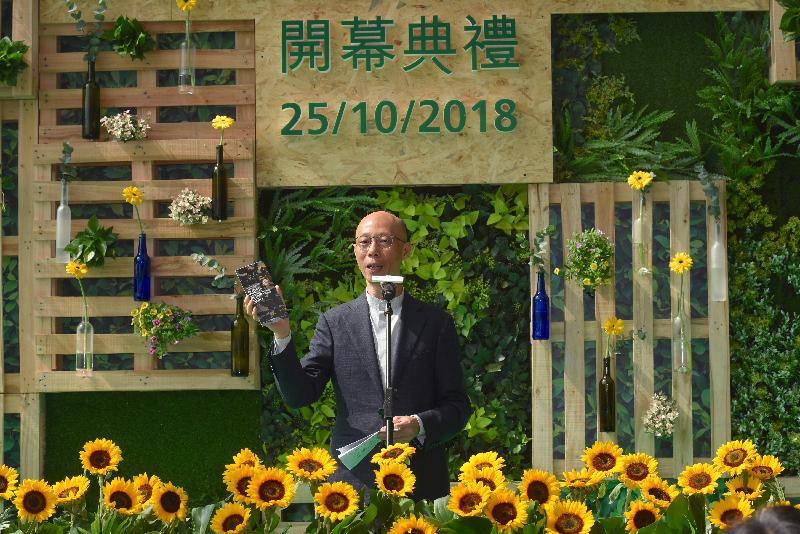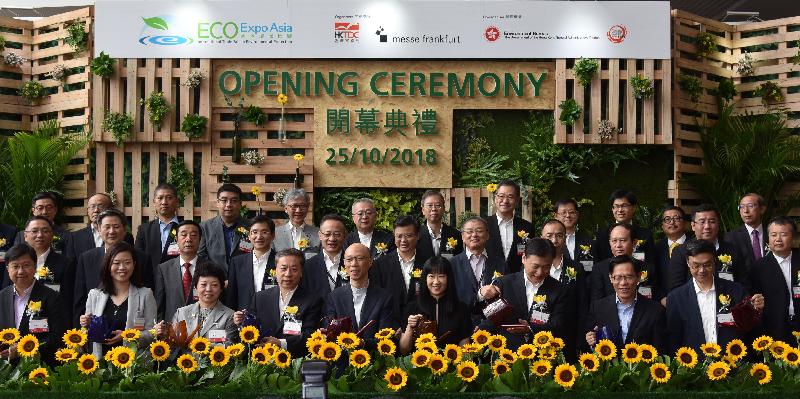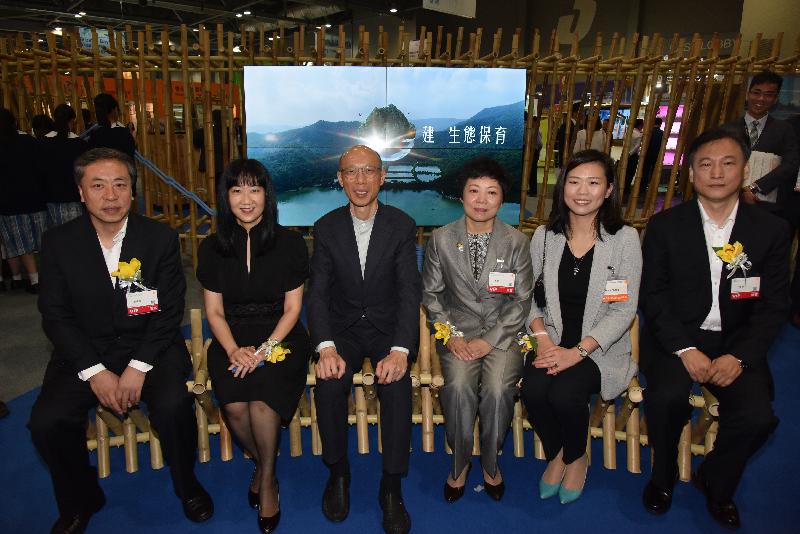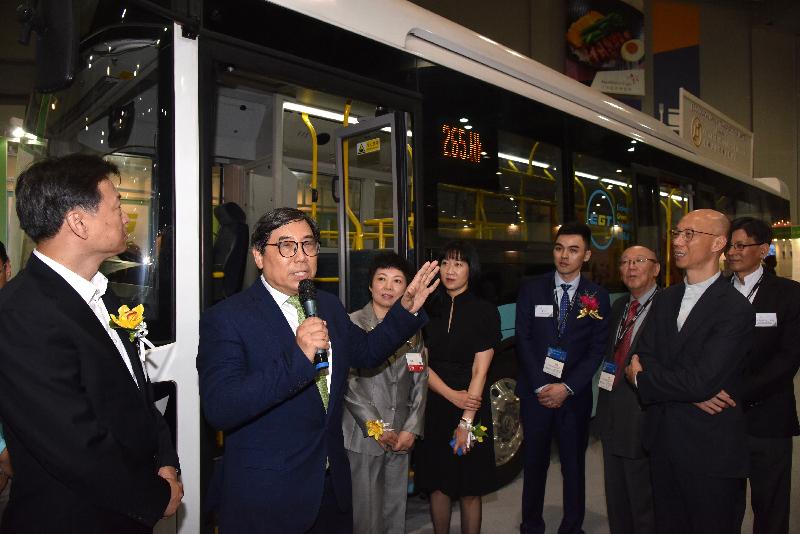Following is the speech by the Secretary for the Environment, Mr Wong Kam-sing, at the opening ceremony of the 13th Eco Expo Asia today (October 25):
Margaret (Executive Director, Hong Kong Trade Development Council (HKTDC), Ms Margaret Fong), Rebecca (Representative of Messe Frankfurt (HK) Limited, Ms Rebecca Zheng), Deputy Director-General Wang (Deputy Director-General of the Department of Resource Conservation and Environmental Protection of the National Development and Reform Commission, Mr Wang Shancheng), Counsel Li (Counsel of the Department of Energy Conservation and Resources Utilization of the Ministry of Industry and Information Technology, Mr Li Li), Counsel Li (Counsel Ms Li Pei, Special Representative of the Minister of Ecology and Environment, Mr Li Ganjie), government colleagues, ladies and gentlemen.
Good morning.
I am very delighted to join you this morning for the opening of the 13th Eco Expo Asia. As said by Margaret, this year’s thematic topic is about “waste less, save energy”, in order to have a low-carbon future. Here I would like to tell you two aspects on how to reduce waste and how to lead to a low-carbon future. The recent Policy Address 2018 by Mrs Carrie Lam highlighted what we are doing, more on waste tackling.
I want to highlight the hardware I saw at the Environment Bureau’s booth inside the exhibition hall. We are doing a number of the state-of-the-art facilities on waste reduction, turning waste into energy and also waste-to-resources facilities. We are commissioning them one by one, including T·PARK in Tuen Mun, which turns sewage sludge into energy. Secondly, it is the WEEE·PARK, which handles e-waste, such as TV, fridges, air-conditioners and also computers, etc. Commenced about a year ago, it turns e-waste into resources. Thirdly, it is the O·PARK in Lantau, which turns food waste into energy plus compost as by-products. All of these are state-of-the-art advanced technologies which help Hong Kong to reduce waste and landfill, and turn these types of waste into energy and resources. I recommend you to see the Environment Bureau’s exhibition booth inside the hall to learn more about it.
Here, I am not talking about hardware only, as software is also very important. The highlight is the introduction of producer responsibility schemes, covering the recycling of glass beverage bottles and e-waste, and the forthcoming one will be for plastic beverage bottles. Implementing them one by one helps Hong Kong reduce waste and also turn waste into resources. We hope to have your support.
Another milestone among the recent Policy Address is the municipal solid waste charging. Other cities of Asia implemented this charging about two decades ago, and this effectively provided incentives to everyone, from recyclers to the trade, to normal citizens, to reduce waste by more than 10 or 20 per cent. We are going to put forward the bill to the lawmakers very soon. We hope to have your support, so that we can transform Hong Kong into a waste less society.
At the same time, as announced in the Policy Address, we would like to provide more public money, ahead of the law. About $300-400 million will be set aside for the forthcoming financial year on waste reduction and recycling, including the outreaching teams to help the community reduce waste and improve clean recycling. We have a pilot scheme on recycling of food waste from commercial and industrial sectors, and turning it into energy and resources. We will also have a pilot scheme to collect plastic from the community from residential and non-commercial sectors to help turn plastic into resources again. Plus, we are about to try out the reverse vending machines to collect the beverage bottles for clean recycling and reuse.
So much on waste. Climate change is very important. Macao, Hong Kong and the region were attacked by the super typhoon, causing severe damage. This is a clear signal, a warning for all of us that we have to strengthen our climate action. Hong Kong released the Climate Action Plan 2030+ earlier to echo the Paris Agreement, so we are having the 2030 target to reduce Hong Kong’s carbon footprint. For instance, the 2030 target is to reduce Hong Kong’s carbon intensity by 65 per cent to 70 per cent by 2030. We are phasing down on coal-fired electricity generation. At the same time, we are supporting more renewable energy in Hong Kong, both by the Government and the community. A milestone starting this October is the introduction of the Feed-in Tariff (FiT) that supports the community and the trade to install and do more on renewable energy at their premises. The Government also wants to do more on renewable energy in our premises, at landfills, at restaurants and also at our buildings. So we hope that moving towards low-carbon and renewable energy can decarbonise Hong Kong. At the same time, we will launch a public engagement to consider possible long-term decarbonising strategy and target for Hong Kong. It would be launched around early next year so that we can gauge views and ideas to help decarbonise Hong Kong.
Before I conclude, I would like to share some good news. One is the collaboration with Hong Kong Trade Development Council this year. The Hong Kong Government, through the Environmental Protection Department, launched the Green Event Guidebook earlier. We hope more events will follow the Guidebook to reduce waste and to save more. The good news is that this Eco Expo Asia has made reference to the Green Event Guidebook. So I hope this collaboration will set a good example for big events with HKTDC, and to further promulgate and promote the message of waste less in other events in Hong Kong. We also hope that organisers and event participants support and reduce waste and do clean recycling. I would like to present in Putonghua the second good news because this event has been strongly supported by the Mainland officials in half a decade. This time we have more than 160 Mainland officials joining this event including 36 delegations.
(Please also refer to the Chinese portion of the speech.)
read more





